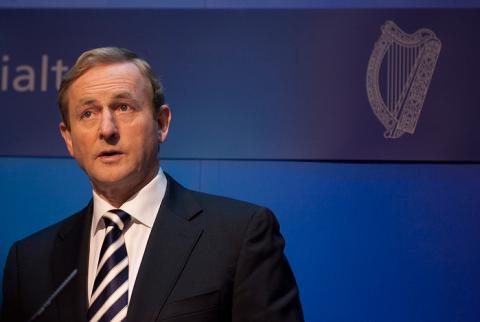Our sovereignty won't be back any time soon

Has no one told Enda Kenny of the plans afoot in Europe to end even a pretence of Irish sovereignty? By Vincent Browne.
Aside from his inspirational vision of making Ireland "the best little country in the world in which to do business" (is that aspiration borrowed from the 1916 Proclamation?), Taoiseach Enda Kenny's other grand design for Ireland is to recover its "economic sovereignty".
Does he not know the pass was sold on that one quite some time ago? Does he not realise that he himself urged us to sell the pass all over again in the Fiscal Treaty referendum earlier this year? Has no one told him of the plans afoot in Europe to end even a pretence of sovereignty? And don't we all know that, when those plans come to us for ratification, Kenny will again urge us to acquiesce?
Ireland surrendered part of its economic sovereignty when it joined the European project in 1973, although the unanimity required initially for EU decisions retained quite a say for even a small peripheral state.
The Single European Act of 1986 changed the terms of engagement with Europe. Apart from enlarging the competences of the European institutions, it provided for qualified majority voting in several areas, which meant that Ireland's voice could be overridden in those areas.
Then there was the single currency project, instituted by the Maastricht Treaty of 1992, which led to the European Central Bank - the institution which has become the unaccountable, undemocratic power centre of the European Union.
But the real significance of Maastricht, in terms of sovereignty, was an acceptance of fiscal criteria designed to support the new currency, but inevitably trampling on sovereignty in crucial ways.
It required inflation to be kept within a certain limit, the annual government deficit to be no more than 3%, the government debt not to exceed 60% of GDP.
Here, at a stroke, a major chunk of economic sovereignty was ceded.
There was a further erosion of sovereignty in the Nice Treaty of 2001, which was a response to the rapid enlargement of the European Union. This involved the abandonment of the unanimity rule in many other areas, and a reduction in Ireland's voting clout.
There was a further erosion in the Lisbon Treaty of 2007 and then, crucially, in the Fiscal Treaty this year, which Kenny enthusiastically urged on us, even though it fundamentally diminished our economic sovereignty.
The Fiscal Treaty requires general government budgets to be balanced or in surplus. It says that the annual structural deficit must not exceed 0.5% of GDP and provides for fines for a country that does not adhere to the balanced budget rule.
It demands that all states submit plans in advance of their budgets to the European Commission for endorsement. Economic policy must be coordinated with other member states, including what is euphemistically known as economic "reforms", invariably involving the further erosion of the living standards of the poorest. All of this to be monitored by the European Commission.
So what is this "recovery of our economic sovereignty" stuff? Things are set to get worse.
Last Wednesday, José Manuel Barroso - the President of the European Commission and the guy who does much of the design planning for the EU - told the European Parliament that it needed "new thinking". This "new thinking" has come up with the "completion" of economic and monetary union and a banking union.
Not just that, but he also said: "The world needs an EU that is capable of deploying military missions to help stabilise the situation in crisis areas [of the world]. We need to launch a comprehensive review of European capabilities and begin a truly collective defence planning.
"Yes, we need to reinforce our common foreign and security policy and a common approach to defence matters because, together, we have the power and the scale to shape the world into a fairer, rules-based and human rights-abiding place."
He said there would have to be a new EU treaty to create a "political union", adding: "We must not allow the populists and the nationalists to set a negative agenda."
There was much in the speech about social cohesion, contradicted a paragraph or two later by stress on labour market and social protection "reforms" - unsubtle code for low wages and uncertain work conditions.
So the surrender of economic and monetary sovereignty will be completed. We will be expected to join in with (or at least approve of) military expeditions to "shape" the world, and a political union will ease us into surrender of whatever political sovereignty we have left.
All of this will be driven by an ideology of "everyone for himself/herself", of free markets, of "light touch regulation" (remember that?), of labour market "reforms" and of low taxes.
And when/if the Irish people come to vote on this new treaty in a referendum, we will be told this is merely just a little more "pooling" of sovereignty. We will be told that if we vote against this, we will be ostracised in Europe and the ATMs will stop functioning; and - the trump card - it will help us make Ireland "the best little country in the world in which to do business".
